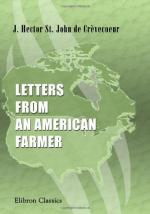inhabitant of these venerable woods, of which they
are come to dispossess them. There men appear
to be no better than carnivorous animals of a superior
rank, living on the flesh of wild animals when they
can catch them, and when they are not able, they subsist
on grain. He who would wish to see America in
its proper light, and have a true idea of its feeble
beginnings and barbarous rudiments, must visit our
extended line of frontiers where the last settlers
dwell, and where he may see the first labours of settlement,
the mode of clearing the earth, in all their different
appearances; where men are wholly left dependent on
their native tempers, and on the spur of uncertain
industry, which often fails when not sanctified by
the efficacy of a few moral rules. There, remote
from the power of example and check of shame, many
families exhibit the most hideous parts of our society.
They are a kind of forlorn hope, preceding by ten
or twelve years the most respectable army of veterans
which come after them. In that space, prosperity
will polish some, vice and the law will drive off the
rest, who uniting again with others like themselves
will recede still farther; making room for more industrious
people, who will finish their improvements, convert
the loghouse into a convenient habitation, and rejoicing
that the first heavy labours are finished, will change
in a few years that hitherto barbarous country into
a fine fertile, well regulated district. Such
is our progress, such is the march of the Europeans
toward the interior parts of this continent. In
all societies there are off-casts; this impure part
serves as our precursors or pioneers; my father himself
was one of that class, but he came upon honest principles,
and was therefore one of the few who held fast; by
good conduct and temperance, he transmitted to me his
fair inheritance, when not above one in fourteen of
his contemporaries had the same good fortune.
Forty years ago this smiling country was thus inhabited;
it is now purged, a general decency of manners prevails
throughout, and such has been the fate of our best
countries.
Exclusive of those general characteristics, each province
has its own, founded on the government, climate, mode
of husbandry, customs, and peculiarity of circumstances.
Europeans submit insensibly to these great powers,
and become, in the course of a few generations, not
only Americans in general, but either Pennsylvanians,
Virginians, or provincials under some other name.
Whoever traverses the continent must easily observe
those strong differences, which will grow more evident
in time. The inhabitants of Canada, Massachusetts,
the middle provinces, the southern ones will be as
different as their climates; their only points of unity
will be those of religion and language.




